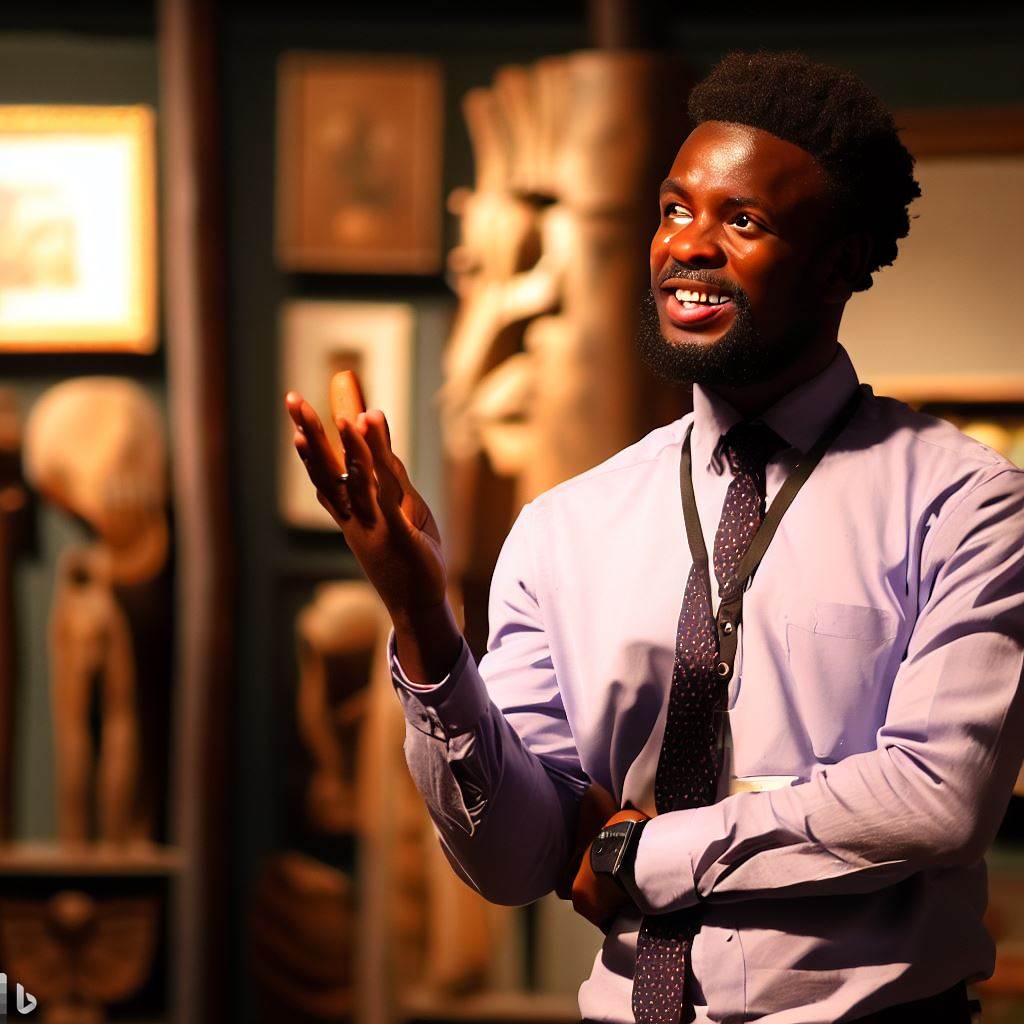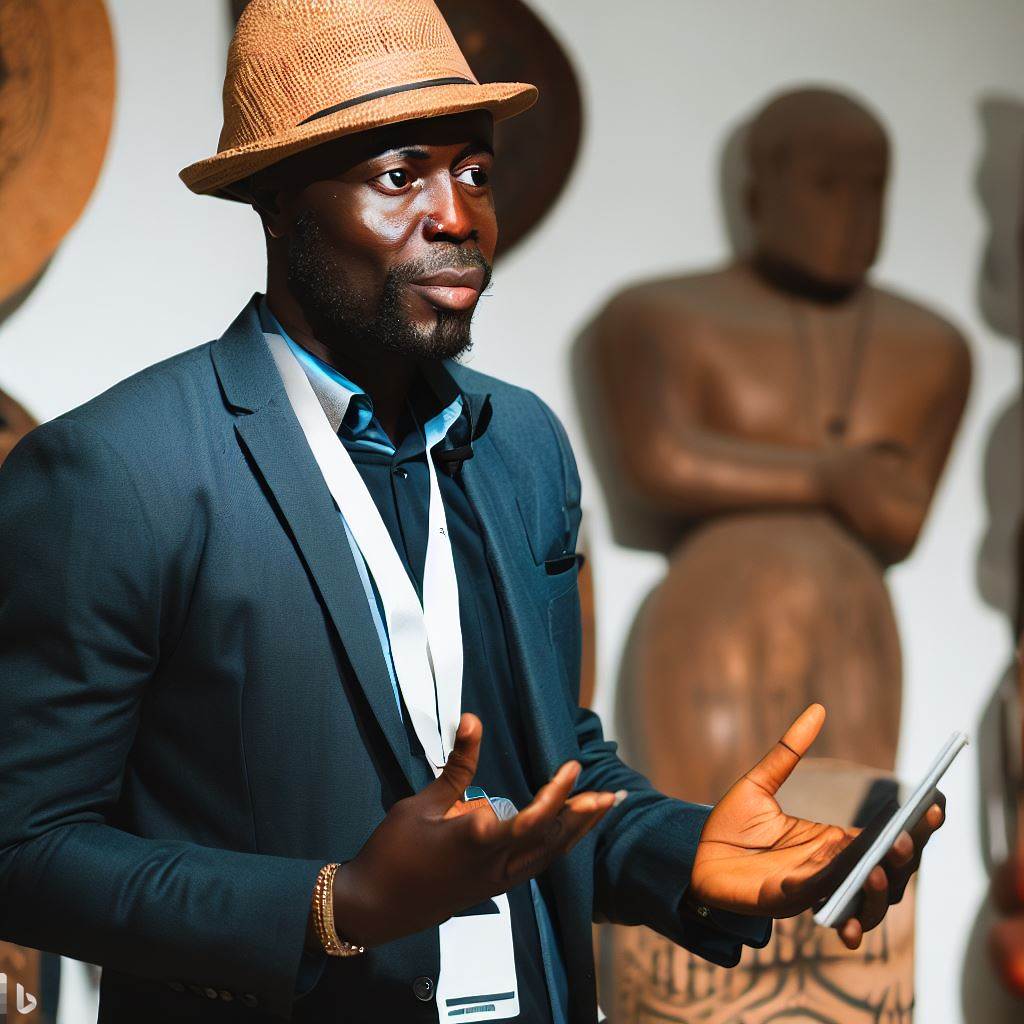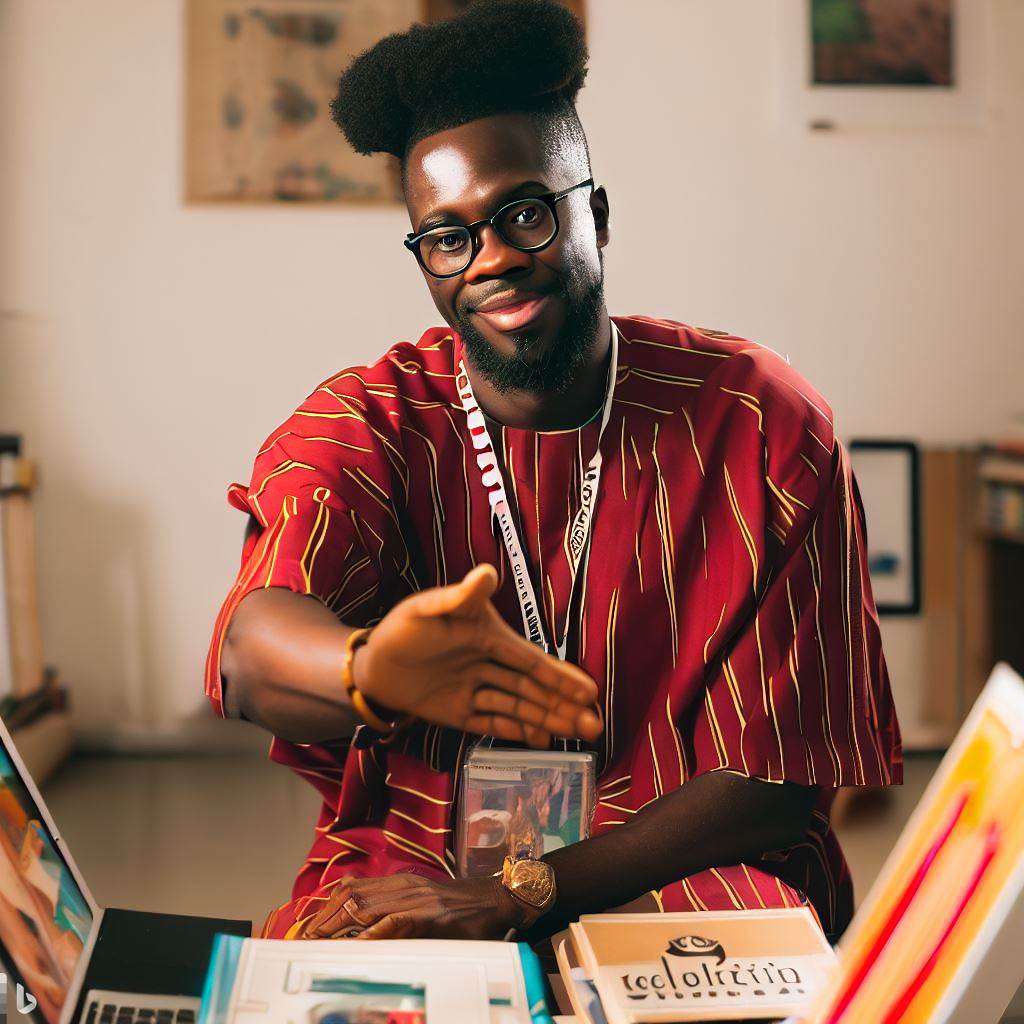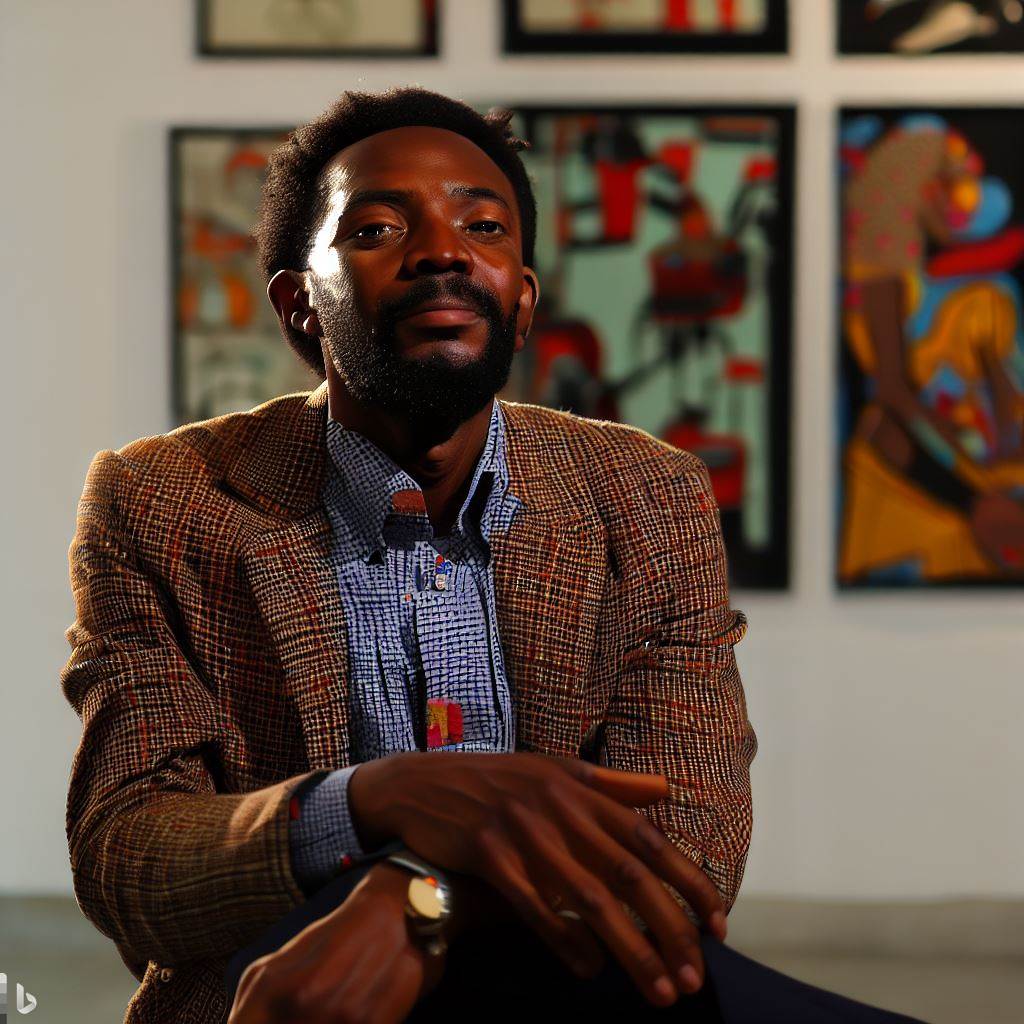Introduction
Let’s delve into the challenges faced by curators in Nigeria museums while managing their responsibilities.
A. Nigeria’s Museums: A Snapshot
Nigeria, a nation steeped in rich cultural heritage, boasts a myriad of museums, each a treasure trove of history, art, and tradition.
From the National Museum in Lagos to the Jos Museum, these institutions house invaluable artifacts, reflecting the nation’s diverse tapestry.
B. The Vital Role of Curators
Curators, the unsung heroes behind the scenes, are the custodians of these historical gems.
They play a pivotal role in preserving, researching, and presenting artworks to educate and inspire.
These dedicated professionals ensure that our heritage remains vibrant and accessible to all.
C. Unveiling the Challenges
This sector delves into the challenges faced by curators in Nigeria’s museums.
From inadequate funding and security issues to the battle against climate-induced deterioration, we will explore the daunting obstacles curators tackle daily.
Their perseverance and innovation are essential in safeguarding Nigeria’s cultural legacy.
Lack of Funding
A. Inadequate government funding for museum maintenance and operations
Nigeria’s museums face a major challenge in the form of inadequate government funding for maintenance and operations.
Museums require consistent financial support to ensure their smooth functioning and preservation of valuable artifacts.
However, the government’s allocation for this purpose falls short of the actual needs.
The lack of sufficient funds inhibits the maintenance of museum facilities and infrastructure, posing significant hurdles for curators.
Essential repairs, such as fixing leaky roofs or updating electrical systems, become delayed or altogether neglected due to the absence of necessary funding.
This compromises the overall conditions of the museum and jeopardizes the conservation of its collections.
B. Insufficient funds for acquisitions and restoration projects
Curators in Nigeria also struggle with a lack of funds for acquiring new artifacts and restoring existing ones.
Acquisitions of culturally significant pieces are crucial for expanding and enriching museum collections.
These additions provide visitors with a more comprehensive understanding of Nigeria’s diverse cultural heritage.
Unfortunately, limited financial resources restrict curators from acquiring valuable artifacts, thus hindering the growth and quality of museum collections.
Additionally, the lack of funds for restoration projects prevents the rejuvenation of deteriorating artifacts, further diminishing their educational and cultural value.
C. Impact of funding limitations on curatorial practices and overall museum experience
The impact of funding limitations has far-reaching consequences on curatorial practices and the overall museum experience.
Without adequate funding, curators are unable to implement innovative exhibition designs, engage in meaningful research, and organize educational programs for visitors.
The lack of financial resources also limits curators’ ability to collaborate with international colleagues or attend relevant conferences, hindering professional development.
These limitations restrict the museum’s potential to become a dynamic space where cultural exchange, education, and creativity thrive.
The insufficient funding indirectly affects visitors’ experiences as well.
Prevented from accessing up-to-date exhibition designs and engaging educational programs, visitors may perceive museums as stagnant or lacking relevance.
This may lead to decreased visitor numbers and a diminished understanding and appreciation of Nigeria’s rich cultural heritage.
The challenges faced by curators in Nigeria’s museums regarding funding are manifold.
Inadequate government funding for maintenance, operations, acquisitions, and restoration projects hinder the overall growth and quality of museum collections.
This, in turn, affects curatorial practices, limits innovation, and diminishes the overall museum experience for visitors.
Limited Resources
A. Scarcity of advanced conservation and preservation equipment
- Museums in Nigeria face the challenge of limited resources when it comes to acquiring advanced conservation and preservation equipment.
- Due to this scarcity, curators often have to work with outdated or inadequate tools, which may not provide optimal results in preserving artworks.
- The lack of advanced equipment makes it difficult for curators to effectively conserve and restore delicate and valuable artworks.
- Without access to modern conservation tools, curators may struggle to maintain the integrity and longevity of the artworks in their care.
B. Lack of modern technological tools for artwork documentation and exhibition
- Another challenge faced by curators in Nigerian museums is the lack of modern technological tools for artwork documentation and exhibition.
- The absence of digital documentation systems makes it hard for curators to efficiently catalog and track the numerous artworks in their collections.
- Without proper documentation, it becomes challenging to provide accurate information about the artworks to visitors and researchers.
- Additionally, the lack of technological tools hinders curators from showcasing artworks in innovative and interactive ways during exhibitions.
C. Difficulties in maintaining proper storage and climate control systems for artworks
- Curators in Nigerian museums often face difficulties in maintaining proper storage facilities and climate control systems for artworks.
- Inadequate storage spaces may lead to overcrowding, increasing the risk of damages to the artworks.
- Without climate control systems, curators struggle to regulate humidity and temperature, which are crucial for preserving delicate artworks.
- The absence of proper storage and climate control systems not only jeopardizes the condition of artworks but also limits their accessibility for future generations.
Curators in Nigerian museums face significant challenges due to limited resources.
The scarcity of advanced conservation and preservation equipment, coupled with the lack of modern technological tools for artwork documentation and exhibition, poses obstacles in their work.
Furthermore, difficulties in maintaining proper storage and climate control systems further impede their ability to preserve and showcase artworks effectively.
Addressing these challenges is crucial to ensure the long-term preservation and accessibility of Nigeria’s rich cultural heritage for generations to come.
Read: Nigeria’s Customer Service Industry: Key Challenges & Solutions
Security Concerns
A. Ongoing threat of theft and illegal trafficking of artworks
Art theft and illegal trafficking are not new issues for Nigerian museums.
These institutions house valuable artifacts that can fetch significant sums in the black market.
The ongoing threat of theft looms over curators, who constantly battle to safeguard their collections.
Artworks, such as traditional sculptures, pottery, and paintings, hold immense cultural significance for Nigeria.
They represent the country’s rich heritage and serve as important artifacts for understanding its history.
Unfortunately, this also makes them attractive commodities for art traffickers.
Despite the efforts of museum staff, criminals continue to find ways to exploit security loopholes.
Inadequate security measures, including limited surveillance systems and insufficient personnel, leave museums susceptible to theft.
This challenge is exacerbated by the lack of funding and resources allocated to improve security.
B. Inadequate security measures
The lack of proper security measures is a pressing concern for curators in Nigerian museums.
Without advanced technology, museums struggle to safeguard their collections effectively.
Many institutions still rely on outdated security systems, making it easier for criminals to carry out their illicit activities.
Additionally, due to limited financial resources, museums often face challenges in hiring and training security personnel.
The inadequate number of staff to monitor the premises further compromises the security of the artworks.
Curators must constantly find innovative solutions to enhance security within their limited means.
C. Conflict between preserving artworks and allowing public access
Curators face a delicate balance between preserving artworks and allowing public access.
Museums exist to educate and inspire the public, and denying access to these valuable pieces would hinder their purpose.
However, the more easily accessible the artworks are, the higher the risk of theft.
Striking the right balance is a complex task. Limiting public access through regulations and security checkpoints may help deter criminals but could also deter potential art enthusiasts.
Curators must carefully consider various factors and devise strategies to maintain security without compromising public engagement.
Some measures that museums can adopt include installing enhanced surveillance systems, implementing strict access controls, and collaborating with law enforcement agencies to combat art trafficking.
These actions would help increase the security of the artworks while still allowing public access.
The security concerns faced by curators in Nigerian museums are multifaceted and challenging.
The ongoing threat of theft and illegal trafficking, coupled with inadequate security measures and the conflict between preservation and public access, create a difficult environment for curators to navigate.
Addressing these challenges requires a coordinated effort from various stakeholders, including government agencies, museum authorities, and the public.
Adequate funding, improved security infrastructure, and thoughtful strategies are essential to protect Nigeria’s cultural heritage for generations to come.
Read: The Future of Customer Service in Nigeria: A 5-Year View
Lack of Skilled Personnel
A. Shortage of well-trained curators with expertise in specific art fields
In Nigeria, one of the major challenges faced by curators in the country’s museums is the shortage of skilled personnel.
Specifically, there is a lack of well-trained curators with expertise in specific art fields.
This shortage hampers the effective curation and management of the country’s diverse art collections.
The field of curation requires individuals who are not only knowledgeable about art but also have a deep understanding of the specific art fields they are working with.
However, in Nigeria, there is a scarcity of curators with specialized expertise.
This creates a gap in the understanding and interpretation of artworks in museums, hindering their ability to provide a comprehensive and meaningful experience to visitors.
B. Difficulty in attracting and retaining talented curatorial staff in Nigeria
Another challenge faced by curators in Nigeria’s museums is the difficulty in attracting and retaining talented curatorial staff.
Many skilled curators prefer working in more established museums and art institutions abroad, as these offer better opportunities for career growth and development.
This brain drain further exacerbates the shortage of skilled curators within the country.
The lack of attractive employment prospects and limited resources for curators within Nigeria make it difficult to compete with international institutions.
Despite the rich cultural heritage and diverse art scene in the country, the lack of enticing incentives and limited scope for career advancement makes it challenging to attract and retain talented curatorial staff.
C. Insufficient training and development programs for curators
Furthermore, there is a lack of sufficient training and development programs for curators in Nigeria.
Continuous professional development is crucial for curators to enhance their skills and stay updated with current trends and practices in the field.
However, the availability of such programs is limited in the country.
Without access to proper training and development opportunities, curators struggle to improve their expertise and keep up with the evolving demands of the profession.
This hinders their ability to effectively curate exhibitions, manage collections, and engage with visitors.
Moreover, the absence of ongoing training programs prevents the nurturing of new talent and impedes the growth of the curatorial field in Nigeria.
The challenges faced by curators in Nigeria’s museums include a lack of skilled personnel, difficulty in attracting and retaining talented curatorial staff, and insufficient training and development programs.
Addressing these challenges is crucial for the effective curation and management of the country’s art collections, as well as the overall growth and advancement of the curatorial field in Nigeria.
Read: Salary Insights: Customer Service Jobs in Nigeria 2023

Learn More: Future of Political Science Profession in Nigeria: Trends
Limited Public Engagement
In Nigeria, museums face numerous challenges in engaging the public and creating meaningful interactions with diverse audiences.
Curators in Nigerian museums struggle with limited public engagement due to low awareness, weak marketing, and a need for innovative strategies.
A. Low public awareness and interest in visiting museums
One of the primary challenges faced by curators is the low level of public awareness and interest in visiting museums this is are Challenges Faced by Curators in Nigeria Museums
Many Nigerians are not familiar with the importance and value of museums as cultural and educational institutions.
Museums often struggle to attract visitors, particularly from local communities.
Publish Your Professional Profile, Business or Brand
Showcase your expertise, gain trust, and boost visibility instantly on Professions.ng.
Publish NowThis lack of awareness and interest can be attributed to various factors, including a lack of formal education about museums and their significance in the Nigerian educational system.
Additionally, museums often struggle to compete with other forms of entertainment and leisure activities available to the public.
The perception that museums are boring or irrelevant further hinders their ability to attract visitors.
B. Insufficient marketing and outreach efforts to engage diverse audiences
Another major challenge faced by curators is the insufficient marketing and outreach efforts to engage diverse audiences.
Many museums in Nigeria struggle with limited resources, making it difficult to allocate sufficient funds for marketing and promotional activities.
As a result, museums often fail to effectively promote their exhibits, events, and educational programs to the wider public for the challenges Faced by Curators in Nigeria Museums
This lack of marketing exposes them to a limited audience and fails to capture the attention of diverse communities who may be interested in exploring Nigerian art and culture.
C. Need for innovative strategies to attract more visitors and foster appreciation for Nigerian art
To overcome the challenges of limited public engagement, museums in Nigeria need to adopt innovative strategies that attract more visitors and foster appreciation for Nigerian art.
One approach could be to leverage technology and digital platforms to reach a wider audience in challenges Faced by Curators in Nigeria Museums
Creating virtual tours, online exhibits, and interactive multimedia experiences can provide a unique and engaging way for people to explore Nigerian art and culture.
This would allow museums to overcome geographical barriers and connect with individuals who may not have the opportunity to visit in person.
Furthermore, museums should focus on developing educational programs and activities tailored to different age groups and interests.
Collaborating with schools and universities can help create partnerships that support curriculum-based visits and workshops, fostering a greater understanding and appreciation for Nigerian art among students.
Additionally, museums should invest in community outreach programs to actively engage local communities.
This can include organizing art festivals, cultural events, and workshops that highlight the richness and diversity of Nigerian art.
By involving the community in the curation and interpretation of exhibits, museums can ensure that they reflect the interests and values of the people they serve.
The limited public engagement faced by curators in Nigerian museums poses a significant challenge.
To overcome this, museums need to address the low public awareness and interest, improve marketing and outreach efforts, and employ innovative strategies to attract diverse audiences.
By actively engaging the public and fostering appreciation for Nigerian art, museums can become vibrant cultural hubs that inspire and enrich the communities they serve.
Read: Training for Customer Service Careers in Nigeria: A Guide
Delve into the Subject: Opportunities in Event Management: Nigeria’s Scope
Indigenous Artifacts Repatriation
A. Challenges in recovering and repatriating stolen or illegally acquired artifacts
- Lack of proper documentation and records make it difficult to identify stolen or illegally acquired artifacts.
- Limited resources and funding hinder the investigation and recovery process of these artifacts.
- The black market, where stolen artifacts are sold, poses a significant challenge in retrieving them.
- Global networks involved in smuggling and trading stolen artifacts create complexities in recovering them.
- Collaboration between law enforcement agencies and international organizations is crucial but often difficult to establish.
B. Legal complexities and international treaties that hinder repatriation efforts
- Disagreements between countries on the interpretation and implementation of international laws restrict repatriation efforts.
- Different legal systems across countries make it challenging to navigate through jurisdictions and legal procedures.
- Lack of strong diplomatic relationships between Nigeria and other countries can hinder negotiations for repatriation.
- Some countries have stringent laws that protect private ownership of cultural artifacts, making repatriation more complicated.
- Limited enforcement mechanisms for international treaties further hinder the repatriation process.
C. Role of curators in advocating for the return of Nigeria’s cultural heritage
- Curators play a crucial role in raising awareness about the importance of repatriating Nigeria’s cultural artifacts.
- They collaborate with international organizations, researchers, and scholars to gather evidence supporting repatriation claims.
- Curators engage in dialogue with foreign museums and governments to negotiate for the return of stolen artifacts.
- They work towards strengthening legal frameworks and international agreements to facilitate repatriation efforts.
- Curators educate the public, both locally and internationally, about the significance of preserving Nigeria’s cultural heritage.
By actively addressing the challenges faced in recovering and repatriating stolen artifacts, curators in Nigeria’s museums can make significant strides in reclaiming their cultural heritage.
Through collaborations with international organizations and the advocacy of curators, awareness can be raised, legal obstacles can be overcome, and stolen artifacts can be returned to their rightful owners.
It is crucial to acknowledge the role curators play in this process, as they are key in preserving Nigeria’s rich cultural heritage for future generations.
Conclusion
A. Recap of the challenges faced by curators in Nigeria’s museums
Throughout this blog section, we have explored the various challenges faced by curators in Nigeria’s museums.
These include inadequate funding, lack of skilled personnel, poor infrastructure, and insufficient resources.
These challenges have hindered the proper preservation and display of Nigeria’s diverse cultural heritage.
B. Importance of addressing these challenges to preserve Nigeria’s cultural heritage
It is crucial to address these challenges in order to preserve Nigeria’s rich cultural heritage and challenges Faced by Curators in Nigeria Museums
Museums play a vital role in educating future generations about their history, traditions, and identity.
By addressing these challenges, we can ensure the proper conservation and documentation of Nigeria’s artifacts and artworks, allowing them to be passed on to future generations.
C. Encouraging collaboration and support from government, private sector, and society at large
To effectively address these challenges, collaboration and support are needed from various stakeholders.
The government should allocate more funds for museum development and ensure the recruitment and training of skilled curators.
The private sector can contribute through corporate sponsorships and partnerships.
Moreover, society at large should actively engage with museums, supporting their initiatives through donations and participation in cultural events.
The challenges faced by curators in Nigeria’s museums pose serious threats to the preservation of the country’s cultural heritage.
By addressing challenges and fostering collaboration among government, the private sector, and society, we can sustainably preserve and promote Nigeria’s cultural identity for future generations.




